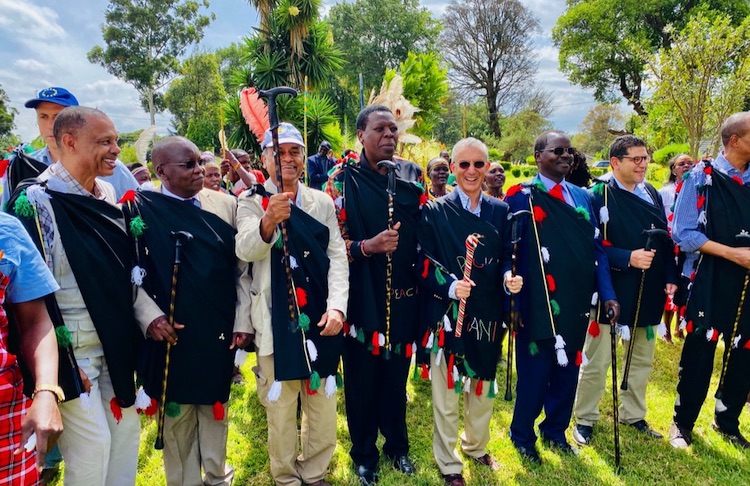Viewpoint by Mohammed Simba Guleid
The writer is the CEO of the Frontier Counties of Kenya and the former Deputy Governor of Isiolo County.
NAIROBI (IDN) – The United Nations estimates that Sub-Saharan Africa loses 40 billion hours per year collecting water. In most of Kenya’s water-scarce regions, this invariably involves an already poorly-nourished mother lugging a 20-kg jerrycan for about three hours every day under 40o C temperatures – often carrying a baby on her back.
In economic terms, UNESCO says, that for every $1 invested in water and sanitation, there is an economic return of between $3 and $34.
For the people living in Kenya’s frontier counties, finding solutions for the social and economic effects caused by a lack of clean water are the highest priority. Finding opportunities to go beyond the beaten path and sustainable solutions was the mission of a joint visit to the counties in the last week of February 2020, supported by the United Nations in Kenya.

< Simba Guleid
Frontier Counties Development Council (FCDC) brings together counties in Kenya’s Northern Frontier. These regions have for a long time been economically marginalised, have suffered fragility, instability, poverty and insecurity. Of late they have witnessed droughts, followed by floods & more recently a swarm of locusts is threatening food security.
This joint mission included representatives of the National Government, Council of Governors the UN and donors. The Frontier Counties Development Council (FCDC) helped coordinate this important visit.
The mission was conducted as part of ongoing efforts by CS Eugene Wamalwa, Ministry of Devolution, Arid and Semi-Arid Lands (ASALs) and the UN system to solidify devolution. The Swiss Ambassador to Kenya, Ralf Heckner once wrote: “Kenya’s decentralization is among the most rapid and ambitious devolution processes going on in the world.”
Thanks to President Uhuru Kenyatta, the once marginalised counties of Kenya, are feeling the positive effects of devolution and the Governors of these counties deserve recognition and praise for their untiring efforts to change the lives of their constituencies for the better.
The FCDC, stakeholders from the region are appreciating the initiatives that indicate a firm commitment for equality and inclusion, but also tangible gains for the common resident of the counties. As far back as 2014 when Siddharth Chatterjee, the UN Resident Coordinator to Kenya, then the Representative of United Nations Population Fund (UNFPA), decided to tackle the outrageous rates of maternal mortality in northern Kenya, surmounting initial scepticism, that initiative brought in public-private partnerships and resulted in transformation of the public health delivery infrastructure and a reduction in maternal deaths in the counties.
We have seen the UN’s determination of not abandoning the region, and staying focused on leaving no one behind.
We have reason to be optimistic that the new focus on water will bring lasting transformation, considering the deleterious impacts we have experienced due to lack of water. Combined with the egregious effects of climate change, scarcity of water is one of the root causes of conflict and a driver of extreme poverty, leading over into degraded health, livelihoods, opening to other negative trends, radicalization, criminality; and forced migration.
Above all, we commend the leadership of the UN in opting for consultation among the different players delivering development in the region. Without local engagement and collaboration among partners, development can at times perpetuate conflict and worsen inequalities.
Collaboration will ensure development programmes by different players are done within a wider context, and local nuances such as relations between and within different ethnic groups, religious groups, or gender, are not missed out.
Thanks to UN reforms, we are seeing the UN is changing. After all it is about country teams delivering as one, in lockstep with the country’s development priorities and not hamstrung by competing bureaucracies and inter-agency tensions on turf.
We believe that the UN is on the right path in bringing regions – for long considered lost frontiers – right into the centre of Kenya’s development narrative.
That is the true spirit of a UN that is fit for purpose. [IDN-InDepthNews – 01 March 2020]
Photo: The Government of Kenya, the UN and development partners receive a warm reception in West Pokot on 26 February 2020. Credit: UN
IDN is flagship agency of the International Press Syndicate.
facebook.com/IDN.GoingDeeper – twitter.com/InDepthNews

